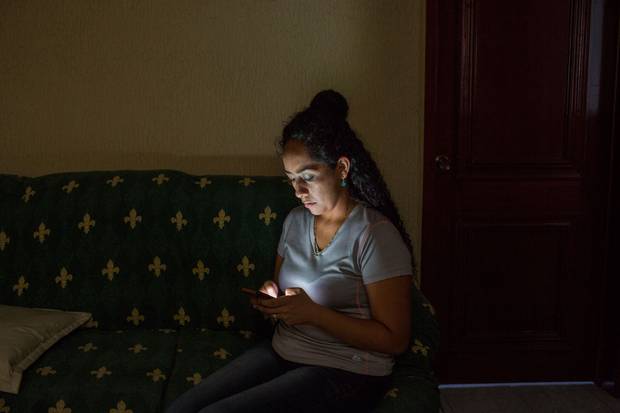On a recent morning, Beatriz Morelos awoke in the predawn darkness. Outside, a dog barked and birds began to trill. I'm not here, she thought, looking around the small room with pink walls. She shut her eyes again. I'm going to wake up over there. All my life is there, years and years.
She glanced at her phone to check the time. In Ohio, more than 3,000 kilometres to the north, her daughters Paula and Evelyn, 10 and 7, were waiting for the bus to school. Her eldest son Anthony, 13, a slim teenager with large brown eyes, had caught an earlier bus. Mackaylah, 4, the youngest, was already in her preschool classroom.
Ms. Morelos looked to see if she had missed any calls during the night. She still clung to the hope that something important might have happened while she was sleeping – that a call would somehow bring news that could restore her life in Painesville, a town near the south shore of Lake Erie.
She thought of the last time she saw her children, before she left for work early on a Sunday morning in July, before an Ohio highway patrol officer pulled her over for a minor traffic infraction, before she was detained and deported to Mexico.
How could 16 years vanish in an instant? Even now, back in León, the city where she was born, she found it hard to comprehend. Each evening she called her husband, David De Jesús, and wept. They had worked hard and raised their children. Now a new president was in office after winning an election with promises to get rid of people like her. She was proof that he meant what he said.
One afternoon, her three daughters bounced in and out of a small frame on Ms. Morelos's phone, all talking at once. They had just arrived home from school in Painesville. Paula, her eldest daughter, now used Kik, a messaging and video chat application, to communicate with her mother. Each day, she would send a flood of affectionate notes and emojis – crying faces, hearts, a GIF of a cat snuggling with a stuffed animal ("This is you and me, Mommy").
Evelyn proudly showed her mother that day's art project, a collage of a tree flaming with autumn colours. Paula announced that Mackaylah had asked a teacher for help in writing a note to her mother. She held up a small piece of lined paper and began to read: "I love and miss you with all my heart. When am I going to see you?"
Ms. Morelos could not summon an answer. She blew her children kisses and told them she loved them. She put the phone down and looked out the white curtains toward the narrow street. "I lose everything in one second," said Ms. Morelos, 34. "My life, my house, my children. Everything in one second."
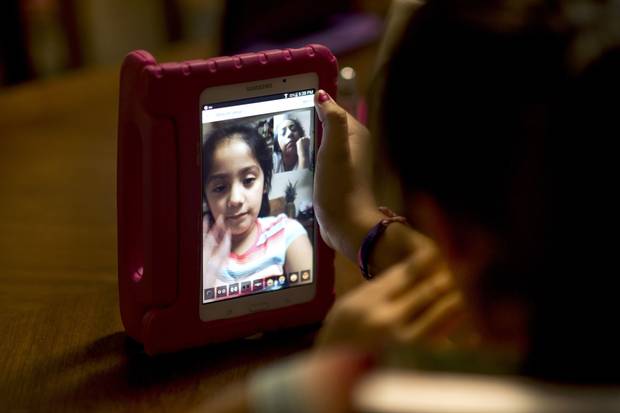
Ms. Morelos’s 10-year-old daughter, Paula, chats with her mother on a tablet. The children haven’t seen their mother since before her arrest in July on a minor traffic infraction, which resulted in her being deported as an undocumented immigrant.
TY WRIGHT/THE GLOBE AND MAIL
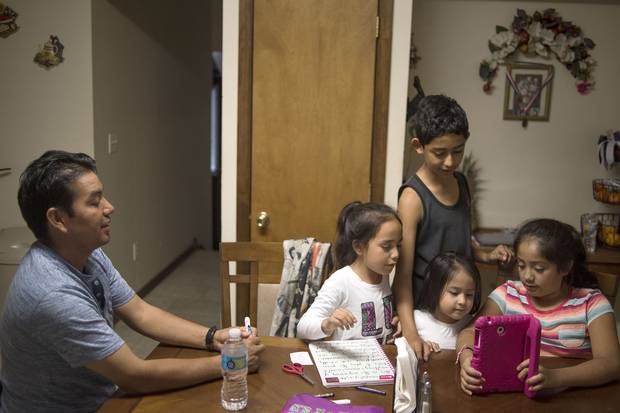
David De Jesús watches at the kitchen table as his children chat with their mother: Daughters Evelyn, Mackaylah and Paula, and son Anthony. ‘I want to tell the Congress, do something, change the rules for immigrants,’ Mr. De Jesús says. ‘I’m working, I’m paying taxes. Why [are] they scared of us?’
TY WRIGHT/THE GLOBE AND MAIL
'Look over your shoulder'
The rupture in Ms. Morelos's life began on an ordinary Sunday morning. On July 23, she woke at 5 a.m. for a mandatory weekend shift at the parts factory where she worked. The night before Mr. De Jesús had taken the three eldest children to Chuck E. Cheese's while she stayed home and watched a romantic drama on Netflix. After Ms. Morelos was done with work on Sunday, they planned to meet for lunch. She never made it there.
Sometimes she wondered how things might have turned out differently if she had taken another road home or if she had encountered a different police officer. But the most important variable turned out to be timing. Ms. Morelos was an undocumented immigrant in Donald Trump's America – and that determined what happened next.
If Ms. Morelos had been pulled over a year ago, lawyers and experts said, she would likely still be with her family. In the latter part of the Obama administration, people like Ms. Morelos – who had no criminal record or recent deportation order, and who had U.S. born children – were not a priority for removal. Immigration authorities were directed to use their discretion to resolve cases like hers.
Since Mr. Trump took office, there has been a sea change. Throughout the campaign, he pledged to ramp up immigration enforcement and crack down on people who were in the country illegally. He began his bid for the presidency by saying that the Mexicans coming into the U.S. were criminals, drug smugglers and rapists ("and some, I assume, are good people," he allowed).
Mr. Trump tapped into a nativist strain in U.S. politics. He portrayed immigrants as unfair competition for American jobs, a drain on public resources and a risk to public safety. His proposed solutions included more deportations, a border wall and some type of ban on Muslims entering the United States.
Now the border wall is snarled in Congress and judges have repeatedly blocked Mr. Trump's travel ban. But he has succeeded in transforming immigration enforcement. "On this issue, he has completely kept his promise," said Muzaffar Chishti, director of the Migration Policy Institute, a non-partisan think tank. "His rhetoric on the campaign matches his actions as president."
Mr. Trump rescinded the Obama-era guidelines which had established priorities for who should be deported and had placed limits on how immigration authorities operate. From the time Mr. Trump became president through Sept. 9, the number of people deported from the interior of the United States – versus at the border itself – increased 34 per cent over the same period a year earlier, according to figures from Immigration and Customs Enforcement, or ICE. The number of people detained who have no criminal record has nearly tripled. Arrests by ICE have jumped more than 40 per cent.
Mr. Trump's supporters consider these moves to be long overdue consequences for people who have disregarded the law for years. To his detractors, they are a cruel punishment for productive members of society who have deep attachments to the country and do work vital to the American economy.
There are roughly 11 million unauthorized immigrants in the U.S., a number that has remained little changed since 2009. About two-thirds of them have lived in the country for a decade or longer, according to the Pew Research Center. What to do about these long-term residents, many of whom have U.S. citizen children, is a question that Mr. Trump's two predecessors tried and failed to resolve. The most recent attempt to reform the immigration system collapsed in 2013.
The Trump administration has made clear that it considers every undocumented immigrant in the U.S. a priority for deportation. In June, Thomas Homan, Mr. Trump's acting ICE director, testified that anyone who is in the U.S. illegally should be worried. "You should be uncomfortable," he said. "You should look over your shoulder."
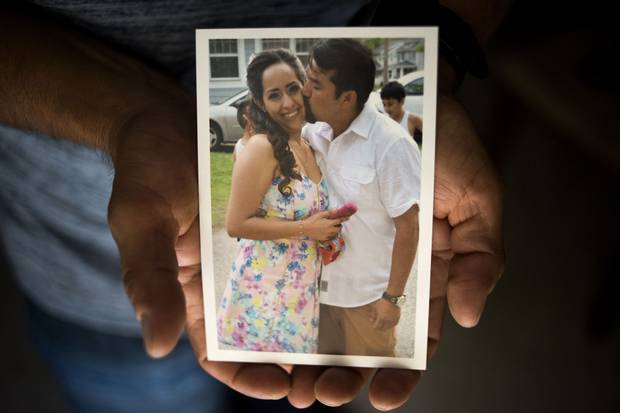
Ms. Morelos and Mr. De Jesús are shown in a family picture. The couple met on Facebook seven years ago.
TY WRIGHT/THE GLOBE AND MAIL

Mackaylah points to a wall of framed pictures of her siblings and parents. Ms. Morelos’s children are American citizens, and she has been adamant to have them live in the United States.
TY WRIGHT/THE GLOBE AND MAIL
'The police stopped me'
As she drove home from work on July 23, Ms. Morelos – whom everyone calls Betty – was not looking over her shoulder, but thinking through her to-do list. A year earlier, she had fulfilled her dream of having her own car. The champagne-coloured 2013 Chevrolet Traverse was also a means to an end: she and Mr. De Jesús wanted to establish a credit rating so they could buy a house in Painesville.
Mr. De Jesús, 39, works as a landscaper in Cleveland and is in the U.S. legally on a work visa. He and Ms. Morelos met on Facebook seven years ago. Mr. De Jesús found Ms. Morelos, who has dark eyes and long curly hair, irresistible; she found him thoughtful and handsome. They loved to laugh together. Ms. Morelos had three children from her previous marriage, a situation Mr. De Jesús embraced. "It's like a combo, fries and Coke," he said of his role as husband and stepfather. "I love the kids, I feel like they're mine."
Mr. De Jesús sometimes talked about saving money for a house in Mexico, but Ms. Morelos was adamant: there was nothing for her south of the border. Her children were American and her parents and siblings were all in Painesville. Mexico was a memory, a place she had not seen since she and a classmate ventured north at the age of 17. Unlike many people she knew, Ms. Morelos did not go to the U.S. in order to support a family. She was in school, which she disliked, and she worried about what opportunities she'd find after graduation. Plus her sister was already in Ohio. But she never expected to build a life there.
Their first attempt to cross in early 2001 was unsophisticated: Ms. Morelos walked up to the border crossing near Nogales, Arizona, got pulled aside, signed some papers and was sent back into Mexico a couple of hours later. A day or two passed and they tried again, this time in a hilly and unguarded area. It worked.
Now Painesville was home. Ms. Morelos had gained purchase on her version of the American dream by working long hours and paying taxes (undocumented immigrants can use a special type of identification number to submit income taxes). Her most recent job at the factory followed work as a babysitter and at fast-food chains like McDonald's and Subway. Over time, she came to love the cozy feeling of being inside on a snowy day and taking her children trick-or-treating on Halloween.
Ms. Morelos was part of a longer pattern in Painesville. For more than a century, the fertile soil in the area has been home to commercial nurseries growing plants and flowers. The large compounds outside town have drawn waves of immigrants – Dutch, Hungarians, Danes, Italians and Puerto Ricans. In the 1980s, Mexicans from León, a large city known for its leather industry, began arriving to work in the nurseries.
After her Sunday shift at the factory ended at noon, Ms. Morelos got in her Chevrolet SUV and drove northeast along an older four-lane highway. An Ohio highway patrol officer was parked on the shoulder. She moved partially into the left-hand lane to make space, but not far enough, according to the officer. He followed her off the highway and turned on his siren.
She pulled over on a side street and hurriedly texted Mr. De Jesús as the officer walked toward her car. " Me paró la poli," she wrote. The police stopped me.
Video footage shows Ms. Morelo being handcuffed and taken into custody.
COURTESY OF DAVID DE JESÚS
'There's nobody to turn to'
The officer, a fresh graduate of the state police academy, wrote tickets for failure to change lanes and for driving without a license. He put Ms. Morelos in handcuffs and brought her to the local lockup, a bulky building with narrow rectangular slits for windows.
He called the nearby U.S. Border Patrol station on his cellphone, Ms. Morelos said, to alert them to pick her up. "In a case where nationality or residency is not able to be ascertained, we would notify the appropriate agency," said Lt. Robert Sellers, a spokesperson for the Ohio Highway Patrol.
Before that day, Ms. Morelos could recall only one prior interaction with the police during her 16 years in Painesville: once, her son Anthony found three dead cats in a trash can so they decided to call the local authorities. Now she would spend nine nights in detention, the first in Painesville and next eight at the Seneca County Jail in Tiffin, Ohio, 200 kilometres to the west.
At the jail in Tiffin, Ms. Morelos was given an orange jumpsuit to wear. She was subjected to twice-daily body searches – mouth, hair, bra, waist band – and had to shower in full view of guards. She slept on a thin mattress on the top bunk in a dormitory with others accused of crimes, many of them awaiting deportation. She met women from Mexico, Colombia, Honduras and El Salvador. "It was the worst time of my life," she said.
Elizabeth Ford, an immigration attorney representing Ms. Morelos, contacted ICE to discuss her case. On July 26, an ICE officer delivered bad news: unbeknownst to Ms. Morelos, when she was turned back at the border crossing in Nogales in 2001, authorities treated it as an "expedited removal," a type of deportation. So Ms. Morelos had no right to a hearing in an immigration court. Instead, ICE would reinstate her old deportation order and remove her from the country on the next weekly flight.
Mr. De Jesús, Ms. Ford and Veronica Dahlberg, a long-time local immigration activist, frantically tried to keep Ms. Morelos in the U.S. On July 27, several hundred people rallied in front of Congressman Dave Joyce's office on the main square in Painesville. Mr. De Jesús stood with the four children, his eyes red with tears; Mackaylah held a sign that read "Stop Separating Families." On Sunday July 30, Father Steve Vellenga, the priest at St. Mary's Catholic Church in Painesville, called the impending deportation of Ms. Morelos "immoral."
Ms. Dahlberg, the founder of the advocacy group HOLA Ohio, said that prior to this year, a combination of public pressure and behind-the-scenes appeals could result in ICE officers exercising their discretion not to deport people like Ms. Morelos. Not anymore. Now "there's nobody to turn to – nobody," said Ms. Dahlberg. "Doors are either slammed in your face or slowly closed."
Ms. Ford filed an official application to stay Ms. Morelos's deportation, noting her absence of a criminal record and four American children. The application was rejected, part of what appears to be a broader pattern. Khaalid Walls, a spokesperson for ICE in the region, declined to say if he was aware of any successful applications in Ohio this year.
The removal of Ms. Morelos, whose full name is Beatriz del Carmen Morelos Barajas, is "the proper enforcement action in this case," an ICE officer wrote in a letter to Ms. Ford. "Your request is denied, there is no appeal."
On Tuesday Aug. 1, Ms. Morelos was awakened early. Guards gave her back the same clothes she had been wearing nine days before when she was first pulled over: purple capri pants, a white t-shirt, Skechers running shoes. Then she was chained at the waist, hands and feet. "Congratulations, you're going back to Mexico!" one of the guards said. Ms. Morelos felt a surge of anger. No one wants to go back like this, she thought.
Together with about 100 others, she boarded a government plane in Toledo, Ohio bound for Texas. That night, she crossed the border on foot into a country she had not seen since she was a teenager. Her destination was Nuevo Laredo, a dangerous city on the border: just weeks earlier, two other Painesville residents had been kidnapped and held for ransom after they were deported there.
Acting on guesswork – ICE does not reveal exactly where deportees are going – Mr. De Jesús had traveled to Nuevo Laredo in the hopes of keeping his wife safe. He waited for hours. Finally, at around 9pm, he saw her walking across the bridge. They fell into each other's arms and began to sob. Mr. De Jesús pointed back at the United States. Look, he said to his wife. There is your country, the one you loved and worked so hard for. Now see what it's doing to you.
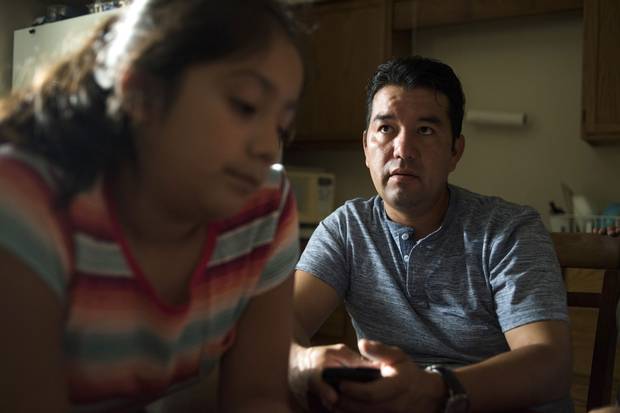
David De Jesús and his eldest daughter, Paula. She says bedtimes are harder now that she and her sisters get no goodnight kisses or hugs from their mother.
TY WRIGHT/THE GLOBE AND MAIL
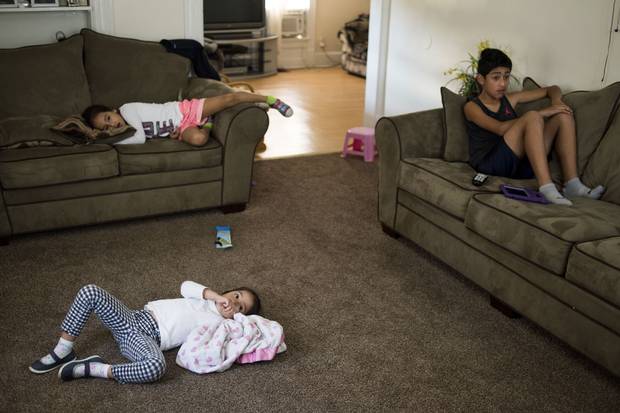
Mackaylah, Evelyn and Anthony watch TV in their living room. Since his mother’s deportation, Anthony says he’s had trouble concentrating in school. Evelyn wants to be reunited with her mother but says she doesn’t want to live in Mexico.
TY WRIGHT/THE GLOBE AND MAIL
'Why are they scared of us?'
In León, Ms. Morelos sometimes woke up at midnight and began to pray without even realizing what she was doing. She exhausted herself thinking about the future. What would happen to her children? Where would they live? What would she do now? Would she ever return to Painesville?
The thought of her home there, a two-storey tan-coloured house with lace curtains, was painful. Upstairs, the three girls share a bedroom which Ms. Morelos decorated with their names in pink letters. Her son Anthony had his own room next door. When trains hurtled by on the tracks at the back of the property, his windows rattled.
Her daughters shared their thoughts with their mother, sometimes effusively, but Anthony was more reserved. Ever since his mother was deported, he was having special trouble concentrating in school. He loved playing soccer but it no longer held the appeal it once did. He did not expect to remain in Painesville long.
For Evelyn, a gap-toothed second grader who wears her hair in a ponytail, bedtime was now the worst part of the day. Paula, her elder sister, agreed: there were no more goodnight kisses and hugs from their mother. But while both sisters longed to be reunited with Ms. Morelos, Evelyn is adamant that she doesn't want to live in Mexico.
Mr. De Jesús was still working his regular long hours as a landscaper. But he was also doing the things that Ms. Morelos used to do – taking Mackaylah to the pediatrician, bringing Paula and Evelyn to the dentist. He was managing with help from Ms. Morelos's family and other relatives.
He struggled, with a sense of heartbreak and anger, to understand what had happened to his family. "I want to tell the Congress, do something, change the rules for immigrants," he said. "I'm working, I'm paying taxes. Why [are] they scared of us?"
Ms. Morelos talked to Mr. De Jesús several times a day, sometimes brief conversations about logistics and sometimes long, emotional conversations about what would happen next. His work visa expires in December and Ms. Morelos is desperate to see her children when school pauses for Christmas.
Ms. Dahlberg, the immigration activist, said that when a parent is deported, families either decide to leave everything behind and reunite in Mexico, or struggle to continue life in the U.S. while separated. Sometimes the strains are unbearable. Ms. Dahlberg told the story of two cousins who were deported from Painesville and later died in the desert trying to re-enter the U.S. to return to their families.
In León, a friend posed the question to Ms. Morelos: why not just brincar – jump – the border again? But Ms. Morelos said no, she would no longer take that risk. Now her days were confined to a small radius around the home that belongs to Mr. De Jesús's parents, whom she had never met before she arrived here early on August 3. She barely recognized the city where she was born.
Sometimes she walked down the narrow street of stucco homes, past a small car repair shop and a tortilleria, to the only place where she felt a sense of peace: a quiet, light-filled church. She took her spot at a wooden pew in the front row. "When you have everything, you don't remember him," she said, gesturing toward the crucifix on the wall. "Now I have nothing, only hope."
Outside the sky was a cloudless blue. Ms. Morelos contemplated the hours remaining in the day. Night times are the hardest, she said, when she goes to bed far from her children and husband. But they also bring relief from the endless loop of worry and helplessness. When she drifts off to sleep, the past, present and future vanish and she stops thinking about anything.
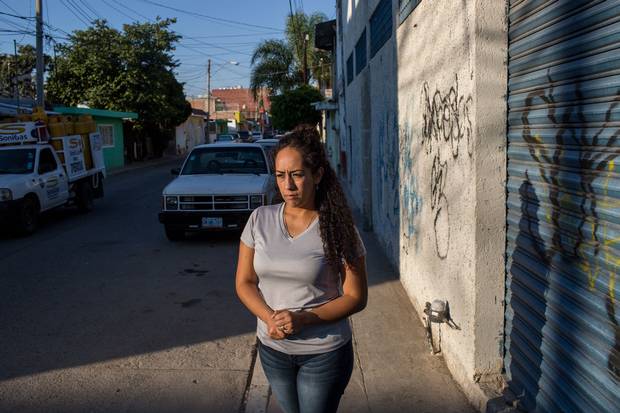
Ms. Morelos: ‘Now I have nothing, only hope.’
BRETT GUNDLOCK/THE GLOBE AND MAIL
EXILES FROM TRUMP'S AMERICA: MORE FROM THE GLOBE AND MAIL
